
Recently on Cyclingnews.com |
Tales from the peloton, December 16, 2008
German broadcasters between a rock and a hard place
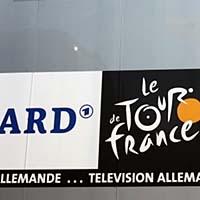
|
The decision by two major German broadcasters to pull out of coverage of the Tour de France is the latest in a long line of disappointments for cycling there. Cyclingnews' Shane Stokes analyses the situation, and hears that the decision is not yet clear-cut.
It's been quite a rollercoaster ride for German cycling. When Jan Ullrich won the Tour de France in 1997, the sport experienced a huge upsurge in public interest, media coverage and participation in that country. Cycling's popularity continued for many seasons and, whenever the Tour de France crossed borders to dip into the country, massive crowds lined the roadside. Between 2000 and 2005 the race visited three times and enjoyed huge support.
That all began to unravel on May 23, 2006 when Operación Puerto scandal began and Ullrich was prevented from racing that year's Tour. He would eventually, retire from the sport when DNA testing proved links with doping doctor Eufemiano Fuentes.
German cycling suffered a further succession of blows; several T-Mobile riders confessed that they had doped during their careers (most notably Erik Zabel and the 1996 Tour winner Bjarne Riis), Patrik Sinkewitz' positive doping control which was announced during the 2007 Tour de France and the subsequent withdrawal of German TV from the race and, later that year, the withdrawal of T-Mobile as sponsor of the magenta team. The Stuttgart world championship was also run under a cloud and saw the UCI fall out with local politicians after the latter refused to pay the full amount of the contracted costs.
2008 brought more bad news. There were a number of high profile positive tests during the Tour de France, and later analyses of blood samples showed that two prominent riders with the German Gerolsteiner team had doped with the new EPO variant CERA. The first was German rider Stefan Schumacher, who won both long time trials and held the yellow jersey, while the second was the Austrian Bernhard Kohl. He had finished third overall and won the King of the Mountains competition.
"ARD is offended when we find guilty riders."- ASO is puzzled that the German channel doesn't recognise the fight against doping. |
The net result of all that? No new sponsor for the Gerolsteiner team, the Deutschland Tour has been cancelled, Milram tried (unsuccessfully) to get out of its backing of the sole remaining German ProTour team, and German TV broadcasters ARD and ZDF announced in October that they would no longer screen the Tour.
The latter is a result of several factors. On the surface it is clearly a reaction to the stream of bad-news stories which have concerned German riders or, in the case of those such as Riis and Kohl, foreign competitors contracted to German teams. But it also reflects the intense political and media pressures that cycling is now under in Germany. Other countries have been badly affected by doping scandals, most notably Spain in relation to Operación Puerto, but Germany is the only one where cycling now appears to be no longer welcome.
TV woes
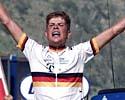
|
On October 16th it was announced that ARD and ZDF would no longer cover the Tour. ARD is understood to have taken the initial decision, with contractual partners ZDF saying that it could not fulfil its part of the deal if ARD pulled out. The organisers of the Tour were unimpressed, stating that they were being punished for carrying out exactly what they were asked to do.
"On several occasions, ARD has asked the organisers of the Tour de France to take all the appropriate measures to fight against doping…," said ASO in a press release. "[However it] is offended when we find guilty riders. We should look and not find. We regret the withdrawal of ARD, thinking of the hundreds of thousands of Germans that welcome the Tour each time it crosses the Rhine River. By its decision, ARD could unfortunately urge those who fight against doping to stop the battle just to ensure a broadcast."
More recently, Cyclingnews sought further comments and clarification from the Tour organisers plus ARD and ZDF, but none of the parties wished to speak. According to an ASO spokesman, the company would not officially comment as ARD had not restated that it would persist in breaching the contract.
The UCI echoes ASO's sentiments that patience should have been shown. "I think what the German channels have done is a ridiculous decision," UCI President Pat McQuaid told Cyclingnews. "I ask why they are victimising a sport that is doing the maximum in the fight against doping, which searches out cheats and then gets rid of them out of the sport and uses every method possible? The sport is introducing the most advanced anti-doping procedures that there is, yet as a result of catching the guys, they stopped the coverage."
"Be careful, don't find too many positives within your sports."- Pat McQuaid also believes withdrawing due to too many doping cases sends the wrong message. |
McQuaid acknowledges that the two broadcasters were under a lot of political pressure, yet is convinced a bad decision has been made. "It is the wrong message to put out. The message which is going out to all sports that have television coverage in Germany is saying, 'be careful, don't find too many positives within your sports, or you're liable to lose your television coverage.' That is not a great message to give."
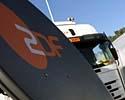
|
The stance of both ASO and McQuaid is that recognition should be given to efforts such as testing for CERA [the first in any sport] and the biological passport initiative. Specifically, they believe that more advanced, determined testing will naturally lead to more positives, and that patience must be shown by broadcasters and others.
This is echoed by a spokesman from Eurosport, who discussed the matter with Cyclingnews. "Eurosport, as the leading sports multi-media platform in Europe, will continue to broadcast cycling because we believe it is our role to help sports find solutions when confronted with difficulties of this nature," said the spokesman, who preferred to remain anonymous.
"It is not Eurosport's philosophy to damage cycling by turning our back on it. To stop broadcasting the event will not solve the underlying problem. We prefer to accompany cycling, and any other sport that may need our help, through this difficult time. We believe that ASO is on the right path. Their stringent controls are cleaning up the event. It is Europsort's role, for cycling and for cycling fans around the world, to support the organisers of the Tour de France by keeping our door open and by broadcasting the event."
Not cut and dried
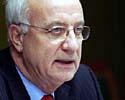
|
As reported on Monday by Cyclingnews, it is not certain that ARD and ZDF will be able to walk away from their contract. The European Broadcasting Union president Fritz Pleitgen stated in November that he considered the deal with ASO to be a binding one, and he took the same stance when Cyclingnews spoke to him recently.
"We have a firm position concerning the contract, the agreement we have signed with ASO," he said, referring to the agreement the EBU negotiated on behalf of its members. "We are sure it is binding and we have let our partners ARD know that this is the case."
An EBU spokesman later clarified the mechanism of the negotiations, stating that ARD and ZDF submitted a joint bid through the EBU to purchase the rights for German TV coverage of the race. He said that ZDF is willing to cover the event, but only if ARD fulfils its part of the deal.
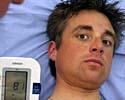
|
Pleitgen accepts that the situation is complicated in Germany and that the broadcasters are, to coin a cliché, caught between a rock and a hard place. "They are under a lot of pressure due to doping, they are always under pressure," he told Cyclingnews. "I understand ARD is under pressure from board members and the broadcasting board, and that was the reason that they wanted to step out [quit the contract].
"Now we will see if they find a common language with ZDF. We have to wait - both members will write their view [as to how things stand], we will check it, then we will go to ASO and wait for their reply. My impression is that the contract is binding now. If they want to have some changes, then they have to negotiate on this contract, which starts on the first of January 2009. Of course there are several recourses in this contract concerning doping."
As stated in the earlier news edition on Cyclingnews, Pleitgen said that Lance Armstrong's return to the Tour makes things more complicated again for the two broadcasters. Former Tour organiser Jean Marie Leblanc blasted the American in 2005 when a L'Equipe story stated that retests on his urine samples from that race showed the presence of EPO. Armstrong denied this and similarly rejected any suggestions that he doped during his other Tour wins, but relations between him and ASO became frosty. However, the organiser now appears willing to allow him to return to the race.
More quotesDavid Harmon, Eurosport TV commentator"The sport had plenty of warning in Germany from the broadcasters. They indicated that their position would be untenable if more doping scandals were to come to light and they have clearly weighed up the economical benefits of staying with cycling in opposition to the potential for income loss in advertising. Over a year of clear warning can hardly be called rash. I also think that there is possibly a culture of having to atone for a country's sins in public in post-war Germany and this could be seen in that way. On a possible fan backlash: "In general I think the highly outspoken fan has become more highly outspoken but that most fans support the efforts of the UCI and teams to root out a long held culture in the sport." On any possible decision by ASO and others to change their current anti-doping course: "Changing direction would, I feel, kill off the sport entirely. The big battle will be to secure funds and the full-scale implementation of the rider passport. It has to be made to work for riders below professional status and grow to encompass genetic profiling." Pat McQuaid, UCI president"I understand that both ZDF and ARD are public service channels in Germany, and therefore they are heavily influenced by politicians. I would imagine that this is very much a case that political pressure has been put on them to take this decision. But it is wrong, because the politicians don't know what they are talking about. They don't understand what doping in the sport is, and they don't understand what the fight against doping is. "Once that decision was taken, then the possibility of getting sponsorship from the Tour of Germany was reduced, and so the Tour of Germany went by the wayside. The people being victimised here are the clean cyclists, which the large majority of the peloton are." Fritz Pleitgen, President of the European Broadcasting Union:"My understanding is that if one side is not playing by the rules as written down, then it would influence how the other side will react. The other side could say that they [the first party] did not abide by the rules, and therefore we have to step out. "Theoretically, the contract starts in January and from there on, there are the first chances to see if the contract is being kept to or not. It's too early now." |
"This could make it very, very complicated for the Germans, as the pressure will grow," said Pleitgen. "I don't know how they would come out of this situation as at the time when they [ARD and ZDF] signed this contact, there was not the slightest hint that he would start his career again.
"I am not in charge of ARD and ZDF, but I can foresee a very complicated situation with them if Armstrong participates"- Fritz Pleitgen sees Armstrong complicating matters in Germany. |
"I personally have a lot of respect for him [Armstrong], how he fights cancer, but I have also questions concerning his past. There are still a lot of doubts whether he used performance enhancing medicine or not. As long as this is not clearly revealed and investigated, then it means the situation here in Germany is a very, very complicated one for both ARD and ZDF. If he competes, then the attacks from all the sides, by newspapers and publications and the board members of the stations will increase and make things more difficult.
"The only thing I can recommend is either Mr. Armstrong will not participate in this race, or he is ready to open all the probes again [in relation to past samples] for the new system of doping investigation or examination. I am not in charge of ARD and ZDF, but I can foresee a very complicated situation with them if Armstrong participates."
Pleitgen can clearly understand the tough climate facing the broadcasters. But even if he is uneasy about Armstrong's return to the race, he also recognises that the Tour organisers have been trying to eliminate drug use in the sport. "I have to admit that ASO is doing a lot to fight doping, and it would be a pity if they are punished for that. It would not encourage other organisers of sport events to be as tough as ASO on doping. It would be, for my personal understanding, a step back in the battle against doping."
Possible outcomes
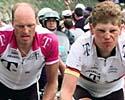
|
Although ASO's acceptance of Lance Armstrong's return to the Tour seems to contradict the organiser's previously stated suspicions about at least one of his Tour de France victories, it is uncertain as to whether ARD would win a court case to get out of its contract. The clauses contained therein allow the broadcaster to walk away if it is shown that the Tour de France is not trying to fight doping.
Yet testing blood samples for CERA after the race had finished illustrated that the organisers and the French anti-doping agency AFLD were willing to go to considerable lengths to detect riders using doping substances.
According to the EBU, ZDF is willing to fulfil its part of the contract, but insists that it cannot do so alone and that ARD needs to be on board. In the event of ARD pulling out, it is understood that ZDF feels that the other broadcaster should pay 100% of any financial penalty for doing so.
What is certain is that ARD is in a very difficult position indeed. It is under considerable pressure in Germany, pressure that Pleitgen admits may increase if Armstrong were to ride. Even if it decides to shelve its coverage while also paying the contract fee agreed with ASO, other penalties are possible. An EBU spokesman told Cyclingnews that if ARD was not able to sublicence the coverage to another broadcaster, that ASO could theoretically demand financial compensation for the race not being shown on German television.
But even if mainstream commercial stations do not carry the race, it will still be available to German TV fans via Eurosport. According to ASO, 97% of homes there have cable television. The political, media and public sentiment may have changed a lot since Jan Ullrich won his Tour over eleven years ago, but it is clear that committed fans will still be able to follow the event. Sadly, the same cannot be said about the Tour of Germany and other such races, plus the teams that have been forced to stop.
Related articles:
Henninger latest German victim
T-Mobile's quick pull out
Jörg Jaksche admission in detail
Holczer talks anti-doping, ProTour and Unibet
Jan Ullrich: A career of highs and lows
The dismal future of German cycling
